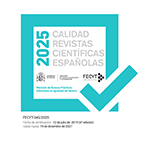A “coup d´etat” and its consequences: The government of Infante D. Enrique in Castile (July-December 1420)
Abstract
A study of the circumstances that caused the July 1420 coup d’état in Tordesillas, giving details on the stages and the fulfilment of the designed plan, the reasons given to overthrow the government, and the legal, political and moral support that the insurgents used to legitimate their actions. The new rulers, a reduced faction of the nobility, did not develop a plan of government due to their inability, lack of time and other reasons, yet satisfied their ambitions for personal improvement. The end of this short period of time was determined by three main factors: discord inside the ruling group, armed opposition led by the Infante D. Juan, and the king´s will to be set free, which favored D. Álvaro de Luna, the great beneficiary.Downloads
Article download
License
In order to support the global exchange of knowledge, the journal En la España Medieval is allowing unrestricted access to its content as from its publication in this electronic edition, and as such it is an open-access journal. The originals published in this journal are the property of the Complutense University of Madrid and any reproduction thereof in full or in part must cite the source. All content is distributed under a Creative Commons Attribution 4.0 use and distribution licence (CC BY 4.0). This circumstance must be expressly stated in these terms where necessary. You can view the summary and the complete legal text of the licence.
En la España Medieval is an open access journal that does not charge authors for article processing (submission, review or editing) or publication.












